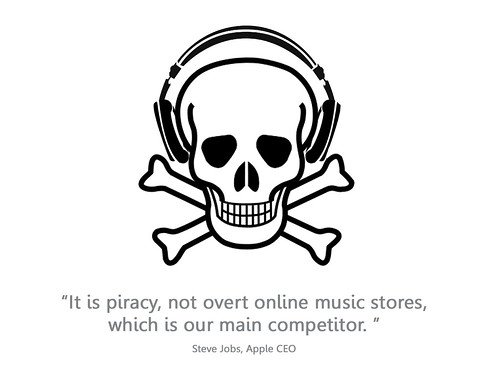Piracy is a major problem for movie studios and record labels alike: expensive and exclusive products are constantly driving consumers to seek cheaper alternatives, particularly in the current economic climate. Legal download services like iTunes and Netflix have flourished as punters look for affordable ways to get their favourite movies, TV and music without busting their budgets. UK legislators, however, have decided that the best way to solve the problem is by bringing the fist down on consumers.

Anti-Piracy
Under the new legislation, the UK’s biggest internet providers would be obliged to monitor the IP addresses of any user who accesses file sharing sites like ThePirateBay, isohunt or torrentz.eu, match them against their own records, and send out a warning letter with a list of locations to find legal versions of the shared files. These letters would likely number in the tens of thousands per month, and would cost the largest providers – BT, Virgin, TalkTalk and BSkyB – around £14m each. Most recently, the responsibility for blocking such sites was taken away from ISPs, as legal action could also be taken against individual sites by the copyright owners. The question of whether it would make financial sense to do so for copyright owners has not been raised. Should users receive three such letters in one calendar year, their bandwith may be slashed or cut off entirely, and will be given twenty days to appeal, through a process many commentators have called a sham.
At present, the legislation is touted as being for the benefit of the creative arts in Great Britain, though the actual beneficiaries are highly unlikely to be the actual producers of said art. Claims that the music industry is imploding are misleading: more money than ever is going into the entertainment industries, but far less is being recouped by major distributors and more by individual producers by digital distribution that cuts out middlemen. New Zealand-based entrepreneur Kim Dotcom was extradited to the United States for criminal activity on his site MegaUpload, his home raided and assets frozen. Since then the New Zealand Supreme Court has ruled the measures illegal and ordered the return of his seized property, though Dotcom remains under house arrest.
Alternatives
Dotcom proposes to begin his new project, Megabox, on a trial basis on August 6, a service that has stated that it will end piracy for good. It gives users an option: pay a Spotify-esque subscription that takes away all adverts, or use it for free with advertising. Either way, 90% of all revenue goes to artists, almost eliminating the fees demanded by record labels, and making them all-but redundant as users are given direct access to desired content.
For film and television, channels like YouTube are already implementing a workable advertising business model, while millions have already availed themselves of services like Hulu and Netflix for high-quality alternatives to expensive cable and satellite subscriptions. Last year $72bn was spent on television advertising in the States alone, while superhero blockbuster Marvel’s The Avengers has to date raked in just shy of $1.5bn in box office, breaking all kinds of records in the process. In a bumper year for the entertainment industry at large, it is strange timing to punish the use of file sharing technology that has the potential to revolutionise the industry and bring it up to date with current innovations.
Catherine Halsey is based in Edinburgh and writes for a digital marketing agency. This article links back to Skype.com.
